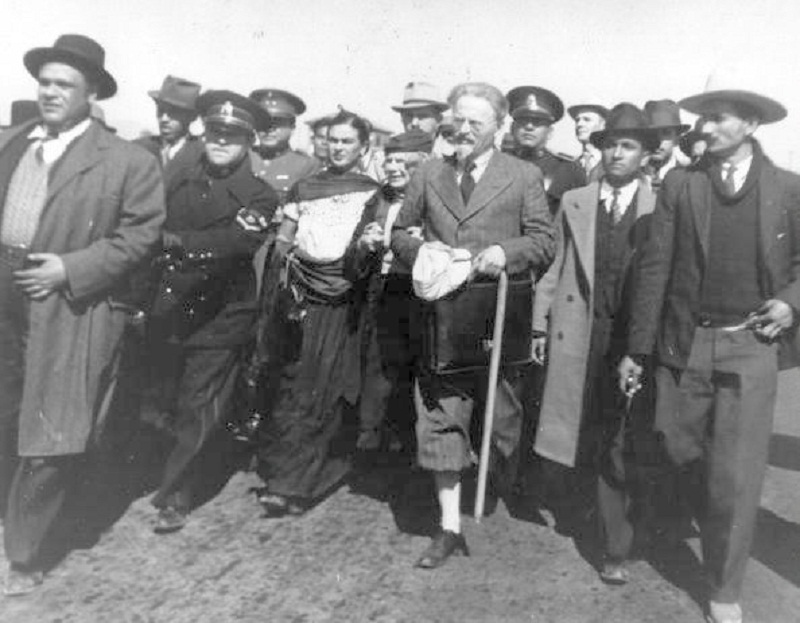This lecture was delivered at a meeting at the Leon Trotsky Museum in Mexico City on August 24.
As we say in the invitation to this commemorative meeting, we are living in turbulent times:
- An economic crisis that never ceases—now on the verge of becoming a world recession—expresses the decay of capitalism. This system not only exploits billions of workers, but also endangers the planet itself, as is now seen in the Amazon’s devastation, thanks to the rapacity of agribusiness capitalists in Brazil, Europe, and the United States.
- Disputes and commercial wars between the great powers, such as the one we see between the United States and China, which foreshadow greater conflicts in the not-so-distant future.
- New manifestations of the class struggle, from workers’ and people’s resistance movements in the streets of Paris, San Jose, Puerto Rico, and Matamoros, Mexico, to the international mobilization of thousands of women for their rights and further thousands of young people against climate change.
In this convulsive world, U.S. imperialism and President Trump are major factors of international instability. His xenophobic and racist policies are a continuation of those of all previous Democratic and Republican administrations: plundering the natural resources of Latin America and subordinating our countries politically and economically.
I
The title of this commemorative meeting is “The Validity of Trotsky in the Present.” His legacy is very relevant to the problems we face today. Trotsky had much to say that can help us understand the character of imperialist politics and the need for an internationalist perspective.
When he arrived in Mexico in 1937, persecuted by Stalinism, the road to a new inter-imperialist war—which he had predicted—was already open.
Years before, in the face of the Great Depression, the founder and leader of the Fourth International had predicted that the economic crisis would only increase the aggressiveness of young U.S. imperialism and that the militarism of the old European powers at the beginning of the century would be child’s play compared to what the United States would develop. He was correct, as the bombings of Hiroshima and Nagasaki would later show.
Trotsky said that just asthe Monroe Doctrine had proposed “America for Americans,” American expansionism would propose “the world for Americans,” that is, for the United States as a result of its rise as an economic power.
In those years, the imperialist policy toward Latin America was concealed behind the slogan “good neighbor”; the United States claimed its goal was to ensure security and democracy in the region.
But the reality was far from that. Latin America was a territory disputed between Washington and rising imperialist powers like Germany. Older powers, like England, were losing influence in the region.
In the discussions that Trotsky and the militants of the Fourth International held with the APRA, a continent-wide populist formation originating in Peru and led by Haya de la Torre, foresaw that the U.S. would not hesitate to deploy “in the near future, an extremely aggressive imperialist policy, directed especially against the countries of Latin America.” This prediction was realized in the military coups led by Batista in Cuba and Somoza in Nicaragua and in the savage repression in Puerto Rico.
This statement exposed the imperialist character of U.S. policy in the region and confronted the acquiescent attitude of the populists. Forces like the APRA embellished democratic imperialism and counterposed it to fascism. Trotsky also confronted the orientation of the Communist Parties, who, depending on the momentary alliances of the Stalinist bureaucracy, supported one imperialist bloc or the other.
The relevance of Trotsky’s statements on US imperialism are obvious. At the time, the United States was attempting to put the Latin American continent in line in preparation for war. Today, it wants to rebuild its hegemony and limit the advance of its competitors, China and Europe, with its own ironfisted policy, together with its continental allies such as Bolsonaro and Macri.
II
It is in this context that we need to understand the situation in Mexico in 1938, which Trotsky dealt with at length.
The expropriation of the oil industry and the railroads, carried out by Cárdenas’ government, provoked the fury of England and the United States. Roosevelt’s and Chamberlain’s governments organized reprisals: an embargo on Mexican oil, along with the companies that shipped it abroad, and a campaign of international slanders. The Democratic government of the United States stopped buying Mexican silver, banned the use of Mexican oil by the government and increased taxes on imports from our country.
For Trotsky, Cárdenas’ policies were highly progressive defensive measures against imperialism. But at the same time, he was clear that they were not socialist measures. There was no need to mischaracterize the Cárdenas government. The government of the Party of Mexican Revolution (PRM, the predecessor of today’s PRI) was “bonapartism sui generis,” of a distinctive character, which “veers between foreign and domestic capital, between the weak national bourgeoisie and the relatively powerful proletariat.” It leaned on the working class and made concessions to it, limiting imperialist capital while subordinating the labor movement to the national bourgeoisie.
Trotsky said the measures taken by Cárdenas could not be understood outside the international situation: that is, the disputes between the imperialist powers and the fact that they had their energies invested in preparing for war.
Mexico, Trotsky said, is struggling hard for its national independence, and the working class all over the world should support it.
For socialists, the anti-imperialist struggle was, along with the agrarian question, the driving force to mobilize the workers and the poor masses. Mobilization: it was the great goal to fight for. But how?
Although the Cárdenas government carried out a courageous action, revolutionaries were (and are) aware that the anti-imperialist struggle cannot go hand in hand with the bourgeoisie. Their parties and their governments—even the most nationalist ones—would not break with imperialism, nor would they attack the interests of the big multinationals to the very end, because this would imply attacking the very framework of capitalist domination in their own countries.
This was later verified when the Cárdenas government agreed on compensation for the American and British oil companies. Later, the right-wing shift of subsequent governments led to the opening of the Mexican oil markets in 2014.
Because of this, the anti-imperialist struggle required the action of the working class, organized democratically and in alliance with the rest of the oppressed and exploited in the countryside and the cities.
Achieving national independence and other key demands such as an agrarian reform were inseparably linked to the fight for socialism and a break with capitalism. This idea was the essence of Trotsky’s theory of permanent revolution and its application to the countries of Latin America. Today, we can say that this dynamic does not apply to issues such as national independence or the land question, but to environmental destruction, which can only be stopped by putting capitalist domination in check.
Trotsky’s strategic legacy was repeatedly verified on our continent. Without going in depth, we can point out that it was confirmed, in the negative, by the so-called post-neoliberal governments of recent decades, of which López Obrador in Mexico is a late expression.
Although they had their particularities, all these progressive governments had one thing in common: they did not seriously question imperialist domination, nor did they contest the payment of the foreign debt, a fundamental mechanism for plundering the region. The result was that this subordination was maintained, and it is now deepening.
III
Returning to Trotsky’s time in Mexico and the expropriation of the oil industry, we can say the active solidarity of the working class of the imperialist countries was an essential part of a strategy for defeating imperialism.
That is why Trotsky addressed the British Labour Party—which brought together the majority of the British working class and was the main force opposing the conservatives in that country—and proposed that it should actively express its solidarity with Mexican workers and repudiate the actions of its government.
Trotsky wrote, in a public letter to the Labour Party published in the Daily Herald: “The further development of the attempts of British imperialism against the independence of Mexico will to a great degree depend upon the conduct of the British working class. … Firm resoluteness is necessary to paralyze the criminal hand of imperialist violence.”
This internationalist perspective is the reason he also told the 2,000 American Trotskyists of the time and well-known union leaders, “It would be good if our party addressed the British Labour Party, the trade unions, the Independent Labour Party, and so on, with the proposition to oppose vigorously Chamberlain’s policy in the oil matter. Our party could take the leading role in this affair.”
This international perspective is also why U.S. Trotskyists came to Mexico to show solidarity with the Mexican people and participated in rallies in favor of nationalizing the oil industry.
Trotsky’s position was that the action of the workers in the imperialist countries, paralyzing the fundamental economic levers, was key to the triumph of the oppressed countries.
He thought, for example, that the actions of the U.S. labor movement for its own demands (even without consciously supporting the Mexican expropriations) dissuaded Roosevelt from taking action against Mexico, fearful that the U.S. workers might converge with their Mexican siblings.
This legacy still has great relevance. If U.S. and Mexican workers unite, they can confront their common enemy. Let’s picture what could be achieved if U.S. workers today confronted Trump’s immigration policies, demanding the opening of the borders and full rights for all migrants, the withdrawal and dissolution of military bodies like the Border Patrol in the U.S. or López Obrador’s National Guard in Mexico. Let’s picture what would happen if the working class in both countries forged a strong alliance against their governments. It would be a powerful catalyst for class struggle and would strengthen the anti-imperialist struggle in all of Latin America.
In the imperialist countries, there is no internationalism outside of anti-imperialism, as asserted by the socialists of Left Voice, a newspaper that is part of the La Izquierda Diario network of online newspapers. This network was started by our international tendency, the Trotskyist Fraction for the Fourth International.
The only way for a revolutionary workers’ movement to emerge in the United States is by breaking with the parties that defend imperialist colonization and calling for the cancellation of the foreign debt. This means fighting for an end to the plunder of natural resources, through which multinational corporations pump, as Trotsky said, the living sap out of our continent.
Moving forward on this path, the U.S. working class will be able to embrace a strategy for communism, to end the dictatorship of a handful of big corporations over more than 320 million people.
This requires building revolutionary organizations in all of our countries, parties anchored in an anti-imperialist and socialist perspective, and rebuilding the world party of socialist revolution.
I want to finish this talk by remembering that in 1934, a manifesto of the Fourth International said the following:
South and Central America will be able to tear themselves out of backwardness and enslavement only by uniting all their states into one powerful federation. But it is not the belated South American bourgeoisie, a thoroughly venal agency of foreign imperialism, who will be called upon to solve this task, but the young South American proletariat, the chosen leader of the oppressed masses. The slogan in the struggle against violence and intrigues of world imperialism and against the bloody work of native comprador cliques is therefore: the Soviet United States of South and Central America.
Today, when new imperialist attacks are looming over the peoples of the region, when the governments of the national bourgeoisie are the administrators of the interests of the imperialist multinationals (even if they occasionally employ progressive rhetoric), the struggle against imperialism and for the effective independence of Latin America can only be won by the working class. It is inseparably linked to a socialist strategy and the struggle for communism.
First published on August 25 in Spanish on Ideas de Izquierda México.
Translation: Óscar Fernández











